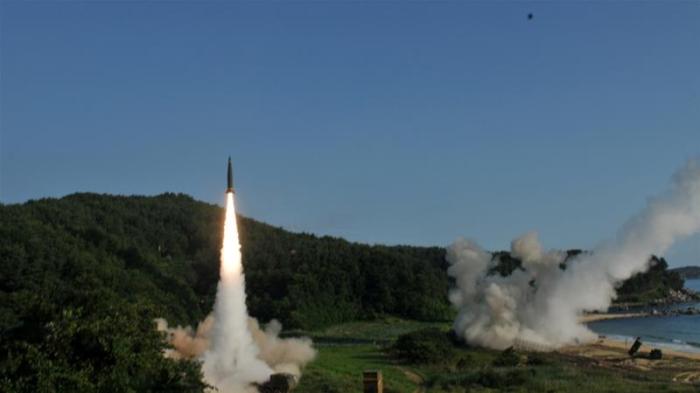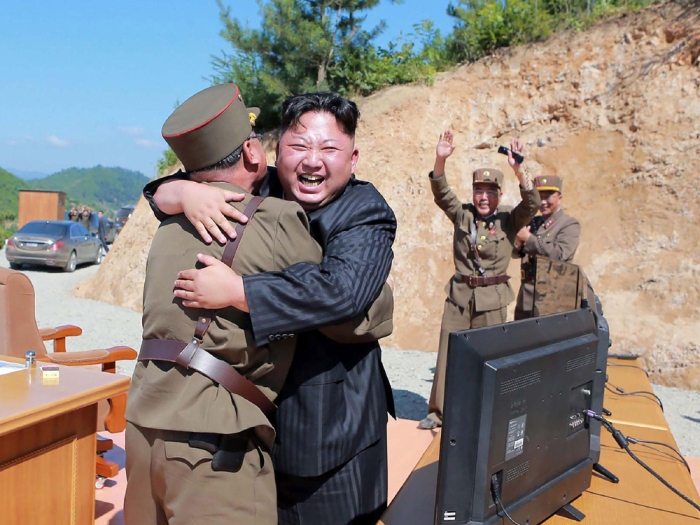With all the discussion surrounding North Korea’s ICBM tests (intercontinental ballistic missiles) tests and the war of words being played out between Trump and the North Korean regime, I felt spurred on to write this post. Much of the public presumes that North Korea is dangerous and unpredictable because we are not used to the extreme rhetoric that is spoken by the regime on a daily basis (to both its own population and to the outside world). What we don’t realise however, is that North Korea is the embodiment of securitisation politics and this extreme level of securitisation is what allows the regime to survive. The behaviour of North Korea is very predictable within this theoretical framework. With securitisation politics also being played out in our own states, it can come as a stark warning to us all – how far would we allow our own governments to go in the name of security?

Securitisation occurs when an issue is elevated from a political issue (which can be dealt with using non-military means) to a militarised solution because there is an existential threat to the state. North Korea came into existence due to conflict (the Korean Peninsula was partitioned by the Soviet Union and the US, after freeing it from Japanese Imperialism). The North invaded South Korea with the help of the Soviet Union and China soon thereafter. Even though the Korean Armistice Agreement was signed in 1953, it was not a treaty and therefore the two Koreas are still legally engaged in war. With the fall of the Soviet Union and China’s refusal to aid North Korea militarily in another conflict or battle, North Korea found itself in a troubling position. Socialist States were collapsing or were engaged in war with democratic States. The North’s ‘senses’ saw that it was in a troubled position and that its politics could be deemed as being unpopular internally if the right influences trickled down (the South moved from a military dictatorship to democracy, which promised a stable existence – remember that South Koreans saw how the US and other Western states functioned, taking influence from wherever they could). Securitisation means that an issue requires emergency measures and justifies actions outside the ‘normal’ bounds of political procedure (as per Buzan, and the Copenhagen School of Thought). Luckily for the North Korean Regime, no ‘normal political procedure’ besides those of Socialism and Imperialism were demonstrated or observable to the public. By remaining constantly in a ‘hyper’ State of War, the Kim family could justify isolating the State from outside influence (including the world economic market) whilst spending and concentrating wealth on the armed forces and ruling elite. Here is where the North ran into a problem however. South Korea, although the enemy and engaged in war with the North (legally) was not interested in the unification of the States through another large scale battle (socially unpopular). They have not made a ‘move’ militarily in this direction or in rhetoric. The South has not always had the means to defeat the North militarily either. This is why, South Korea has always depended so heavily on the US. South Korea therefore, does not constitute an existential threat to the North (lacking both capability and intent) and it would be difficult to portray South Korea as their ‘biggest’ enemy, without them playing the game. China also does not present itself as an existential threat to North Korea. Having a ‘buffer’ State in-between itself and South Korea (backed militarily by the US) is incredibly reassuring. China also wants to promote Socialism as a viable political system, despite the extremities of North Korea. By threatening the existence of the North Korean regime, China would face an asymmetrical battle – facing infiltration by North Korean agents, running ‘amuck’ (the assassination of Kim Jong-Un’s half-brother in Malaysia using biological weapons demonstrates this threat and capability). For this reason, China may allow limited economic trade with it’s neighbour in order to ‘prop’ them up, but it does not want a tense relationship to get messy to the point of no return.

The only State in the world capable of destroying the North Korean regime, is the undisputed unipole – the US. It has the military and economic means to support a war on the Korean peninsula and is the ‘moral police’ of the world, spreading Democracy as it sees fit. George W. Bush mentioned that North Korea was part of the axis of evil, which could constitute intent. The US plays into the rhetoric of North Korea perfectly, allowing the Kim regime to keep its poor population poor, and forcing them to prop up its ill-equipped armed forces at all costs. The only ‘real’ currency or bargaining chip that the North could have, is nuclear weapons. It is for this reason, that North Korea will never give up its nuclear ambitions. The United States had its chance to demonstrate to the North Korean regime that it did not constitute an existential threat to the State in the 90s and early 2000s, but did not make a move. The North Korean regime now needs to keep up perceptions for its own internal survival, that they have the capability and intent to ‘continue’ to wage war with the Imperialist US (Myers and Lankov have also suggested this). Here is where the catch lies however, which makes a physical battle between the two States unlikely. North Korea does not have this ‘capability’. Even if they had a deployable nuclear warhead, it is unlikely that they have second strike capability. This means, the regime knows that if it were to deploy a nuclear bomb, they would themselves be wiped out by the US. North Korea has no other real military power that could threaten the United States. It will never be as technologically advanced nor have the economic means to sustain a war (remember it has trouble feeding its own population and armed forces at times). The regime knows this, but for the sake of appearances however, it needs to convince its population that the sacrifices they are making for the regime have purpose and that the regime is doing a good job at keeping an attack by the US at bay because of their own might. The State’s existence has therefore been securitised by the regime itself. By also having a deployable nuclear warhead, it can act as a deterrent to the US (whose population would not be willing to accept large amounts of civilian casualties or a large blown out war, let alone a nuclear war).
War of Words
While I don’t believe the Kim regime believes it can win a fight against the US, I will not dismiss the power of words. The difficulty lies in North Korea’s overblown warmongering rhetoric and how Trump will measure Kim’s actions and psychological state. At the moment, it seems that Trump is giving Kim a taste ‘of his own medicine’ by stating that the US will release fire and fury on a scale never seen before if US land is targeted in an attack. It’s possible of course, that Kim could become more paranoid about losing power if the US acts on one of its threats and the North could act irrationally by pre-empting a strike (leading to self-destruction) or by miscalculation. We have not seen that North Korea acts irrationally however (just as Realism posits). Remember the US intelligence community has stated that it has no reason to believe an imminent attack is present. The North is known to make small military movements (i.e. shooting at fishing vessels and across the DMZ on a few occasions) and will probably continue to test its missile capabilities near other state’s borders (as they propose to do with Guam – they have not threatened to strike Guam itself, which would be a statement and an act of aggression in terms of international law). There is no reason North Korea would stop its nuclear program. Stopping the program is illogical. As the North see’s the US as an existential threat and is able to position the US like this to it’s own advantage China cannot stop North Korea’s nuclear program without creating massive problems for itself. North Korea has almost always waited for the US to make a move – North Korea’s survival narrative is based on a conflict with the US and unfortunately, the US is playing into North Korea’s game and world view, which is the biggest failure of all.
S.
Look like americans are going mad